Trudy J. Morgan-Cole's Blog
November 18, 2025
The Husbands, by Holly Gramazio
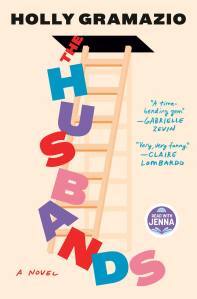
I absolutely loved this ridiculous, high-concept book about an unmarried young woman who comes home one day to discover her husband waiting in their apartment. The husband has simply spontaneously generated in the apartment, as if she’s opened the door into an alternate life in which she’s married to this man. Some time later, as she’s still adjusting, he goes up into the attic to get something and a different husband comes down, which is how Lauren realizes that her attic is somehow manufacturing husbands.
I found this story great, and very engaging. It’s a very fresh take on the “all the alternate lives you could have lived” idea, much like The Midnight Library but far less preachy and predictable — while I knew from page one how The Midnight Library was going to end, I was unable to predict right up to the very end what the solution to The Husbands would be, or where (and with whom) Lauren would end up. Yet I found the ending very satisfying when it came. It’s also a bit of a commentary on the age of online dating – not that Lauren is finding these men through Tinder; she’s getting them out of the attic, but she does go through a stage where she’s getting a new husband and quickly sending him back to the attic for a replacement every day or two, simply because she wants variety or thinks the next one might be better.
Great premise; great execution; no notes. Loved this book.
The Eights, by Joanna Miller
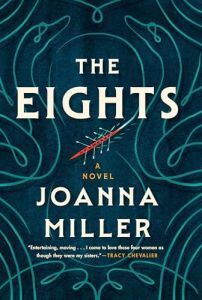
I really loved this book about four young women attending Oxford University in the year 1920, just as women were being granted degrees for the first time (though with many, many strictures and stipulations that did not apply to male students, including needing to have a chaperone virtually anywhere they went outside their college, and receiving their degrees in a separate ceremony from the one in which the men were granted theirs).
It reminded me, of course, of my favourite novel, Gaudy Night by Dorothy L. Sayers, which is set about 15 years later than this book (and written in the year it’s set, 1935) as Harriet Vane is returning for a reunion — so Harriet would have been a contemporary, more or less, of the young women in this novel. Unlike Sayers, Miller puts her undergraduates at a real, rather than a fictional, Oxford women’s college (Sayers, living in the time she was writing about, probably felt she needed the shield of a fictional college to avoid the criticism of writing too closely about real people) and she mixes some actual historical figures in with her fictional characters. The excitement and ambiguity the girls themselves feel about being at Oxford, along with the way the recently-ended Great War still casts its shadow over everything, made this novel feel like a very realistic depiction of place and time.
November 17, 2025
We Could Be Rats, by Emily Austin
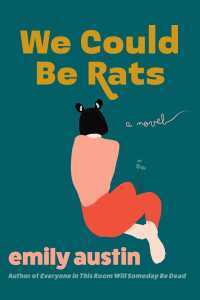
We Could be Rats is the newest book by Emily Austin, whose novel Everyone in This Room Will Someday be Dead I read and discussed on a Bookswap! podcast episode with my daughter Emma a few years ago. Everyone in This Room was Emma’s book pick, and fits neatly into the category of books that, around that time, made me ask Emma, “Are all the young people really so sad?” to which she replied “Maybe it’s just the writers.”
While “sad young people” is a broad genre in contemporary literary fiction, some writers carry it off better than others, and Emily Austin is one of the good ones. The Sad Young Person in this novel is Sigrid, who is writing a very, very long and frequently revised suicide note explaining why she is in such despair that she is taking her own life (big content advisory on this one, obviously). The letter is addressed to her sister Margit, the one who seems to always have her act together, unlike Sigrid, who hasn’t finished high school, doesn’t have a good job or a steady relationship, and mostly seems a little lost.
There’s a great twist partway through this novel, which I felt the author could have leaned into even a little more through the narrative voice, though I can’t explain further what I mean by that without giving away the twist, and I’m not going to do that. Despite that one caveat I found this book well-written and moving.
Precipice and Munich, by Robert Harris
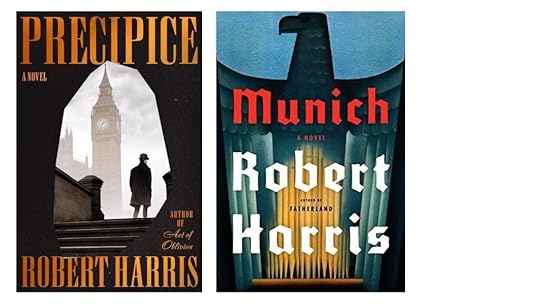
These two books by Robert Harris, one of the masters of historical fiction, are not a series or even officially linked, but I read them within a few weeks of each other and it makes sense to discuss them together. Precipice is about the weeks leading up to the outbreak of WW1, focusing mainly on UK Prime Minister Herbert Asquith and his relationship with his muse/mistress/hard to say what exactly she was, the much much younger Venetia Stanley. Munich is about events leading up to the outbreak of WW2, specifically the infamous Munich Conference at which Britain, France, and Italy agreed to allow Germany to annex the Sudetenland, without inviting Czechoslovakia to the conference. This novel focuses primarily on two fictional characters, an English civil servant and a German one, who were close friends in university years and now meet again at this tense moment of international intrigue.
There’s a lot to dig into with both these novels, and I really enjoyed both of them, but the big takeaway is that I came away with a lot more respect for Neville Chamberlain (at least, as he is portrayed in this admittedly fictional, but well-informed, depiction), who is generally associated with weakness, appeasement, and generally Letting Hitler Get Away With Things. As for WW1-era Asquith, I didn’t know enough about him before this to have an opinion, but whatever opinion I might have had would certainly have gone down after reading about how this middle-aged man behaved like a lovesick teenager over a woman young enough to be his daughter, to the point of regularly compromising national security by revealing state secrets in his letters to her.
October 19, 2025
All the Way to the River, by Elizabeth Gilbert
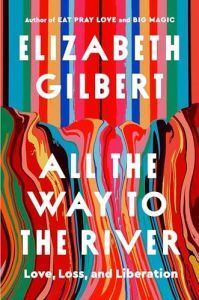
My experience as a reader and, I guess, fan of Elizabeth Gilbert goes all the way back to Eat, Pray, Love, which I read and loved in the very early days of this blog. (She had already published a collection of short stories, a novel, and a non-fiction book before EPL catapulted her into celebrity, because like most overnight successes, she’d been working for awhile to get there. I haven’t read any of those).
I followed her through her exploration of marriage as an institution and her own second marriage in Committed. I adored her novel The Signature of All Things, thought Big Magic had some good things to say about creativity even if the woo-woo was a little much for me. I thought her novel City of Girls was good-but-not-great (understandable after reading her latest book and knowing the conditions under which she wrote City of Girls).
But now her new memoir is out, and the question is … can I follow Liz All the Way to the River?
This book has gotten a lot of attention, a lot of praise from Gilbert’s biggest fans, a huge amount of backlash, and some very bad reviews along with some good ones. It’s the story of Gilbert’s relationship with Rayya Elias, who was initially her hairdresser and then her best friend for many years, including the entire time while Gilbert was married to her Eat, Pray, Love/Committed husband. When Rayya discovered she had terminal cancer and only six months to live, Gilbert suddenly realized that this obsessively close friendship was actually both romantic and sexual (something she had been working hard to deny to herself for several years).
She left her husband, declared undying love to Rayya, and moved in to the house Rayya was living in, a house Gilbert owned and had been keeping her in rent-free for years. Gilbert’s plan was to spend the last months of Rayya’s life taking care of her true love and walking with her “all the way to the river” (the river is DEATH). This plan went a little off the rails when Rayya, a recovering heroin and cocaine addict who had been slowly relapsing with alcohol throughout their friendship, careened into full-blown addiction again in the last months of her life — and those months went on much longer than the six months Gilbert thought she had signed on for. Things got ugly, and everything fell apart, to the point where Gilbert seriously considered murdering her abusive, addictive, dying girlfriend — not to put Rayya out of her misery, but to release Gilbert from the misery of being with her.
It’s quite the journey, and it’s told in Gilbert’s trademark style: with some raw honesty, some great prose, some snark, and a more-than-healthy dose of uncritical woo-woo. The woo begins right at the start of the book with a much-too-long scene in which Gilbert is visited by Rayya’s spirit several years after her death, and “Rayya” gives Liz permission to write this book. I’m always mind-boggled when anyone interprets messages from the dead in such an unsuspicious, naive way, but particularly when the beloved dead person is sending you messages that are so perfectly aligned with what you obviously want to hear. Did Liz Gilbert ever, at any point, think “The voice of Rayya that I think I’m hearing is maybe just my own brain taking on her voice and telling me to go ahead with the book project”???
Apparently not.
Gilbert, who takes an eclectic path to spirituality (hence her time in the ashram in India in Eat, Pray, Love, which followed several years of studying mediation with a guru), also talks to God. A lot. And God talks back — though God’s voice, like Rayya’s, sounds suspiciously close to Gilbert’s own voice, or at least what you’d think she’d like to imagine God saying. The interspersed short chapters where Gilbert records her conversations with God are the worst writing in the book: twee, cloying, and cringe-worthy. I’m sorry, maybe for someone else they were enlightening and inspiring. I also talk to God, and sometimes think maybe I’m getting answers, but I can’t imagine putting these conversations in a book for other people to read. Whenever anyone poetically writes what they think the voice of God is saying to them, I just want to turn the page, or in this case skip ahead in the audiobook till I get to the next chapter of the actual story, which is what I did.
The story itself is compelling and well told: a love story, a story of passion and obsession, a story about codependency and love addiction, a story about an addict relapsing, a story about grief, a story about confronting the darkest side of your own nature when your life spins out of control. Gilbert brings Rayya vividly to life on the page, though, for me at least, the larger-that-life, vivacious, ruthlessly honest woman she depicts sounds like a rude, self-absorbed nightmare of a person — and that was before she started using drugs again. But attraction is famously subjective, and while I didn’t find Rayya’s character appealing at all, she was vividly drawn, and it was very easy to believe that Gilbert was head-over-heels in love with her.
Gilbert is also ruthlessly honest about her own mistakes: she sincerely believes she is a sex and love addict, and that her grand passion for Rayya was all about fulfilling her own needs, and this led her to do terrible things, including enabling Rayya’s slide back into active addiction and, oh yeah, almost murdering her. Gilbert is not celebrating any of this, or treating it lightly. She acknowledges that she screwed up, in dark and terrible ways, because this is what addiction does to people — as every memoir by an addict will tell you.
The story continues beyond the rock-bottom moment where Liz plans to murder Rayya (but doesn’t): Gilbert gets her shit together just enough to tell Rayya she can’t go on living like this; Rayya goes to stay with an ex-girlfriend who takes her in only on the condition she gets clean and ruthlessly manages her withdrawal and her medical care; Liz comes to stay, reconciles with sober Rayya, and soon after Rayya dies and Liz confronts the rest of her life. If you strip out the conversations with God and dead people, and ruthlessly edit down the chapters at the end when Gilbert gets into twelve-step programs in order to stop careening from one relationship to another, and if you entirely leave out the cringeworthy chapter about Gilbert learning to care for “Lizzie,” her inner child … then you’d be left with one hell of a memoir, which is what this book should be.
Unfortunately, because of the book marketing machine and to some extent the Elizabeth Gilbert Machine, it can’t be just a hell of a memoir. It has to also be a self-help book (memo to the world: memoirs don’t have to be self-help books! Writers, you can just tell us what happened to you, without telling us what we’re supposed to learn from it — we can decide that ourselves!). Gilbert has to address herself to all the codependents and sex/love addicts and anyone who’s been pulled into someone else’s addiction or used an addiction of their own to deal with their trauma and loneliness — spreading the net as wide as possible to convince everyone that they have Something To Learn from this book, rather than just reading a compelling story and taking our own thoughts and conclusions away from it.
I can’t buy into binary thinking on this one: this isn’t either a good book or a bad book. It’s a really good memoir wrapped up in the pink cotton-candy cloud of a terrible self-help/spiritual-guidance book. I want to read the gritty, painful story of bestselling author Liz Gilbert smashing up her life on the rocks of Rayya Elias, and a little glimmer of hope at the end to tell me she made it out alive and learned something. Cut the rest.
Has she learned something? I appreciated Gilbert’s honesty in admitting that the place of inner peace she reaches by the end of this book is very similar to the place she reached at the end of Eat, Pray, Love. One day at a time, and all that. Who knows where she’ll be in another 20 years, but I hope not still stuck in the same cycle all over again.
Recognizing her own fallibility and tendency to repeat destructive patterns, should Gilbert have written yet another book that will be hailed by some of her fans as a guideline for living better? Maybe, maybe not. Should she have written (and should she profit from) a book that exploits not just her own pain and darkest moments, but the pain and darkest moments of someone she loved? Is the book exploitative? At least one member of Rayya Elias’s family has gone on the record (though unnamed) to say she thinks it is, but others are OK with it (including Dead Rayya, if you believe Gilbert’s visions).
You can read it and decide, if you like addiction memoirs in which people do terrible things under the grip of their addiction, or grief memoirs that are honest about the messiness of seeing someone all the way to the river. Or you can not read it, and that would be OK too. You can even read it and linger thoughtfully over Liz’s conversations with God … though I, personally, still recommend skipping those.
October 18, 2025
Skipshock, by Caroline O’Donoghue
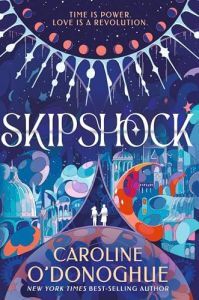
Having read and loved Caroline O’Donoghue’s novel The Rachel Incident (which you can also hear me going on about on my podcast), I decided to give her fantasy novel a go. Skipshock is categorized as YA fantasy, but apart from the two main characters being in their late teens, there’s nothing that for me really distinguished it from fantasy written for adult readers: the worldbuilding is as complex and the stakes as high as in any adult fantasy.
Skipshock is a world-crossing fantasy novel (fantasy, but with what I’d consider some sci-fi elements also) in which Margo, a young Irish girl on a train on her way to boarding school suddenly gets jolted into a parallel world in which she is also riding on a train and meets Moon, a young travelling salesman. Moon lives in a universe of interconnected worlds where some people are able to travel from world to world, but the means of travel is strictly controlled by those in the richer and more comfortable worlds. Margot falls in with a group of freedom fighters who are trying to win back the right to travel freely between worlds and believe that her ability to cross from a previously unknown world might offer a key to opening the routes between worlds once again.
This was an engrossing novel in which, as I got near the end, I started to get that uneasy feeling that there was no way the story could be wrapped up in the remaining pages. And sure enough, it turns out Skipshock, just recently released, is “the first in a planned duology” so I will have to wait a year or more to find out what happens to Margo and Moon. But I think it will be worth the wait.
The Impossible Fortune, by Richard Osman
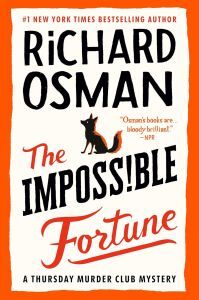
This fifth installment in the beloved Thursday Murder Club series is a worthy addition to the collection. In fact, I found this more fun to read as the mystery was a little less convoluted than it has been in some of the past books. There’s still lots of emphasis on character and setting as much as on plot, which is one of the delights of this series for me. This book is the first one released after the original book in the series was made into a Netflix movie, and there’s a sly joke inserted here as a nod to people who complained about a specific casting choice in the movie, along with lots of other gentle humour. I really enjoyed this book.
Good Wives, Nasty Wenches, and Anxious Patriarchs
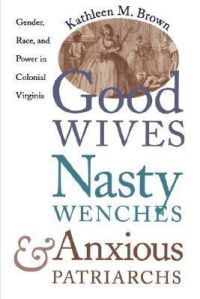
This was a book I picked up for research purposes and I didn’t actually read all of it, only the chapters relevant to what I was writing about, but it’s a very interesting piece of historical writing (intended more for the scholar than the general reader, but not entirely inaccessible to general readers). Essentially, it’s about how the roles of white and Black women in colonial Virginia became more clearly defined as English settlement and African slavery there became more entrenched, and how it was in the interest of the white male men who ruled the colony — those “anxious” patriarchs” to define white and Black versions of feminine experience almost in opposition to each other, so that neither could be an effective threat to the power of white, Christian, English men.
Weyward, by Emilia Hart
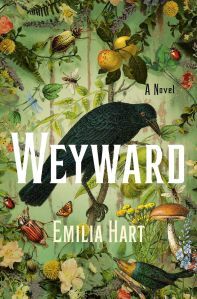
Weyward is a triple-timeline novel about three women in the same family line with a heritage of nature magic/witchcraft in their DNA. Seventeenth-century Altha is on trial for witchcraft; Violet, a teenager at the beginning of WW2, is hemmed in by her father’s narrow expectations of what a woman’s life can be; twenty-first century Kate is fleeing an abusive marriage. While these women don’t know their history or the power of their family connection, each finds refuge in the same location — a cottage on the outskirts of an English village — and learns to use her power and break free of the restrictions that bind her. A nice feminist fantasy: I found Violet’s story the most powerful and affecting of the three.
The Paris Express
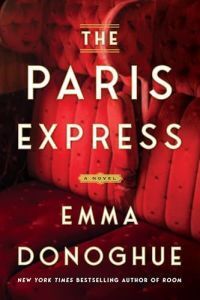
A very short, almost terse, “bottle episode” of a novel, Emma Donoghue’s latest book imagines the hours leading up to one of the most famous train disasters in early rail history (famous because of the photograph of it, not because of a huge death toll or anything). Peopling her train cars with a mix of real historical figures who are known to have been on that train, real historical figures who weren’t but plausibly might have been, and a few wholly fictional characters, Donoghue brings this tiny slice of space and time to life with her trademark vivid style.



